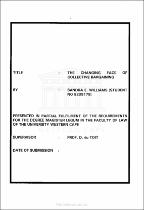| dc.contributor.advisor | Du Toit, D | |
| dc.contributor.author | Williams, Sandra E. | |
| dc.date.accessioned | 2023-06-14T07:07:46Z | |
| dc.date.available | 2023-06-14T07:07:46Z | |
| dc.date.issued | 2001 | |
| dc.identifier.uri | http://hdl.handle.net/11394/10236 | |
| dc.description | Magister Legum - LLM | en_US |
| dc.description.abstract | The International Labour Office submitted that Collective bargaining is an evolving social institution, subject to continuing process of change and growth. As practiced today in many countries, it is far different from the process of negotiation which trade unions sought to carry on with employers until late in the nineteenth century. At that time, it was necessary for trade unions to threaten with a strike or actually to declare a dispute before employers would negotiate with them over their demands". This quotation is general but it encapsulates the very essence of South African labour relations and is the reason for this thesis - the evolution of collective bargaining. The current Labour Relations Act 66 of 1995 has a lengthy history with regard to industrial legislation and several milestones document the developments and changing attitudes that have taken place towards the collective bargaining process in south Africa.2 | en_US |
| dc.language.iso | en | en_US |
| dc.publisher | University of the Western Cape | en_US |
| dc.subject | South Africa Labour Relations Act no. 66 of 1995 | en_US |
| dc.subject | South Africa Industrial relations | en_US |
| dc.subject | South Africa Collective bargaining | en_US |
| dc.subject | Western Cape Labor unions | en_US |
| dc.subject | South Africa | en_US |
| dc.title | The changing face of collective bargaining | en_US |
| dc.type | Thesis | en_US |
| dc.rights.holder | University of the Western Cape | en_US |

